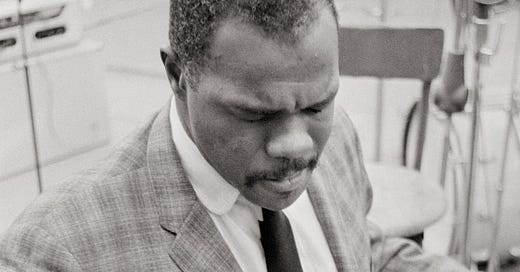Welcome Archival Find: Hasaan Ibn Ali's Metaphysics
56 Years Later, a Followup To A Sparkling Debut
Here we have a needle in a haystack in a dense forest under six feet of snow: The never-released second record from musically significant Philadelphia pianist and composer Hasaan Ibn Ali.
Jazz scholars have long known about Metaphysics, the followup to The Max Roach Trio Featuring the Legendary Hasaan. It was recorded in two days in 1965, then put on the backburner by Atlantic Records when Ali was arrested for narcotics possession later that year.
And then Metaphysics met a tragic fate: The master tapes were lost in a vault fire that claimed many beloved masters from the Atlantic catalog. The trail went cold. By the mid ‘70s, Ali had grown withdrawn, playing only occasionally in public. He died in 1981.
Those who inquired about Ali’s lost work were told that not even a basic backup was extant. Still, a few jazz historians kept asking questions. The pianist and author Lewis Porter burrowed into the matter, and eventually, in 2017, galvanized a search at Rhino Records, the archival imprint for Warner Brothers and Atlantic. What turned up was a “safety” backup monaural copy containing most of the album. That’s what Omnivore is releasing today.
The find roughly doubles Ali’s recorded output. It offers more of his challenging twisty-road compositions, which carry traces of Thelonious Monk as well as the stride-influenced piano that Ali played early in his career. Metaphysics also makes plain that Ali – or as Odean Pope, the tenor saxophonist who made his recording debut on this date, calls him “HassanIbnAli” – was not just a Monk manque but a player and thinker of uncommon originality.
Pope regards Ali as a mentor and a beacon, and says that he and others, including John Coltrane, were profoundly transformed by the time they spent sitting around the piano in Ali’s parent’s home, playing and studying. Scholars note that Ali’s ideas about jazz harmony directly influenced Pope and others; for confirmation, cue up Metaphysics’ opening track, “Atlantic Ones,” and listen through the first chorus of Pope’s solo. There’s a bit of “Giant Steps” chord motion and some wider, less obvious leaps that glance in the free-jazz direction. It’s a tricky road map but you can’t tell that listening to Ali, who accompanies Pope with sideways jabs and a lighthearted irreverence. By sheer force of will, he pulls the saxophonist into a memorably percussive, sparring exchange.
This spirited communication runs throughout this record. It goes between the themes and around the notes, and it involves the masterful bassist Art Davis (who understood Ali’s work well, having played on the Roach record) and drummer Kalil Madi. Pope says Ali was particularly good at getting musicians to approach the act of playing music as an ongoing exchange rather than a skills exhibition. Still, others who were involved in the thriving Philadelphia jazz culture of the early ‘60s remember being intimidated when Ali showed up at clubs: Saxophonist Archie Shepp, who learned to play at those sessions, remembers that Pope was the only horn player who understood Ali’s music. Shepp describes the pianist as an “imposing figure” and says that he and most of the other young musicians would happily pack up their instruments in order to listen to the pathfinding original music Ali and Pope pursued.
Metaphysics will not rearrange anyone’s jazz cosmology of the 1960s – it’s got ear-stretching passages, but it’s also loose and almost unravels in a few spots. But it establishes and extends what’s known about Hasaan Ibn Ali’s contribution to the art — as a composer of rigorous yet sweetly lyrical music, as an influence on a generation, and a pianist with a visceral, spirited and also devious approach to improvisation. That first record identified this jazz enigma in marketing-speak, as “The Legendary Hassan;” the second helps explain why so many musicians spoke of him in tones of reverence. And awe.
[This title did not come up in a Spotify search on day of release; please seek it out elsewhere.]
Why yes, we have a fancy digital suggestion box. Share your favorite Underloved/Overlooked records here: echolocatormusic@gmail.com.
Please consider subscribing (it’s free!). And…..please spread the word! (This only works via word of mouth!)






